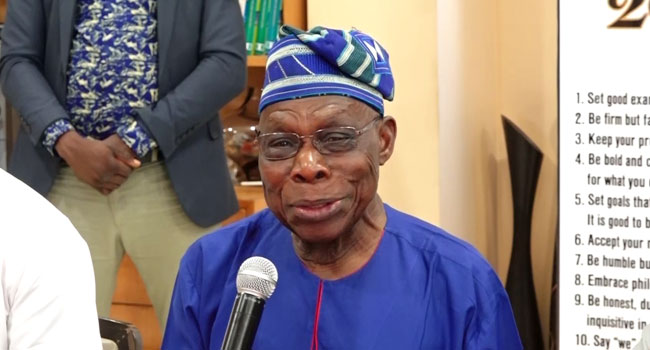Nigeria
Obasanjo: Africa’s Poverty is Not an Act of God

Former President Olusegun Obasanjo asserts that Africa’s widespread poverty is not divinely ordained but the result of poor governance and leadership, urging for more proactive solutions.
According to Olusegun Obasanjo, the ex-President of Nigeria, the vast poverty in Africa is a result of human actions rather than an act of God.
At the Jomo Kenyatta Stadium in Kisumu, Kenya on Monday, Obasanjo delivered this statement during the opening ceremony of the FESTAC Africa Festival.
There is no justification for the poverty on this continent, considering its plentiful resources as stated by the ex-head of state.
“It is not an act of God that Africa is poor,” he said. “Our impoverished state stems from a negative mentality, and we must awaken to the wealth of resources available at our disposal.”
Throughout history, it is evident that whenever there was a need for laborers, Africa was the go-to destination to transport black individuals to make others wealthy. This trend of exploiting our people persists even today and has resulted in colonialism while we continue to be impoverished. It’s time for us to awaken from this cycle.
The idea of structural adjustment originated from the World Bank, but I dissented due to our lack of organizational framework. How could we adjust something that wasn’t clear? It felt like a mere ruse on their part.
Obasanjo reminisced about the revival of the Festival of Arts and Culture, which was held in Nigeria during his military leadership in 1977. This festival had also been conducted earlier in Dakar, Senegal, back in 1966 for its first edition which gained immense recognition.
The former president reminisced about his involvement in the festival 47 years ago when it was held in Nigeria. He expressed gratitude to Kisumu County Governor, Anyang Nyong’o for hosting FESTAC and contributing towards its revival and resurgence. Feeling emotional, he noted that after the initial festival held in Senegal in 1966, there wasn’t another one for over a decade.
READ ALSO: Nigeria’s GDP Grew by 3.19% in Q2 2024 — NBS Reports
In 1975, Nigeria committed to organizing the festival once more. Though arrangements were made, a change in administration prompted some individuals to propose its cancellation. I remained resolute that we should push on and ultimately accomplished hosting it triumphantly.
He further stated that the occasion was a triumph and drew individuals from diverse parts of the globe, such as Papua New Guinea, Australia, and America. Black people were also in attendance at this event.
Obasanjo admitted that the occasion had been put on hold for more than forty years as it was solely entrusted to the government.
Obasanjo, who served as a democratically elected president from 1999 to 2007, praised the persistence and dedication of Yinka Abioye – Chairman of FESTAC Africa International.
“At this moment, I want to express my appreciation for Yinka (Abioye) in reviving FESTAC while I am still alive,” he said.
During his speech, Obasanjo requested the presence of former Kenyan Prime Minister Raila Odinga to join him on stage.
“Heard that, brother? Don’t just leave me stranded here. Come join me on stage,” he joked.
Obasanjo urged for backing Odinga’s bid to become the Chairperson of the African Union Commission. He reminded that despite coming together at FESTAC ’77, black people continued to face exploitation and marginalization. Obasanjo believed in achieving unity as a solution against this persistent issue, adding how the revival of FESTAC marks a crucial aspect towards unifying Africa once again.
If the continental free trade agreement is not successful, we cannot make progress as a continent through the AU. Therefore, reforms must take place within this organisation. It seems contradictory for them to develop programs but rely on funding from outside sources such as the European Union. As High Representative for the Horn of Africa appointed by the AU (which includes Kenya, Ethiopia and Somalia), I was unable to perform my role due to lack of funds provided by UA upon my appointment.
While we were anticipating monetary aid from the US, EU and Germany amongst other countries, I utilized my contacts to appeal to the African Development Bank’s leader who extended support which facilitated breakthroughs in Ethiopia. Regrettably, even a modest amount of $500k was not forthcoming from AU.
The person we require must possess knowledge of Africa’s challenges and comprehend the AU’s expected role. I am convinced that Raila Odinga fits this description as he has worked alongside me on these matters, demonstrating a deep understanding of them.
He mentioned that despite Africa’s attainment of political liberation, it still lacks economic freedom.
He added, “We require an individual like Odinga to take charge of the AU and deliver the necessary reforms and guidance needed for Africa’s economic liberation.”
Additionally, he urged African leaders to reject Western concepts that prove ineffective for the continent.
“We possess all the necessary resources to generate wealth,” he stated firmly. “It’s up to us to take action; relying on others is not an option. Ignoring our potential puts us in a perilous position, as our young people are experiencing restlessness, unhappiness, bitterness, anger – due to unemployment and discontentment.”
The anticipated future cannot be delayed any further, immediate action is demanded. Our failure to comply will result in severe consequences; nevertheless, we possess the necessary ability to satisfy their requirements promptly.
